BATH – A thunderous explosion that demolished a brick duplex and killed one person Tuesday was likely triggered by a propane leak in the building’s heating system, authorities said.
Investigators with the state Fire Marshal’s Office spent Tuesday afternoon peeling back layers of debris at what remained of the apartment building at 29-31 Bluff Road, searching for clues about the blast. They expected to continue their investigation Wednesday.
They suspect that propane, a gas that’s heavier than air, accumulated in a low spot in the building, which had a 3-foot-high crawl space, and was ignited by a spark.
At 5 a.m., residents of the Atlantic Townhouse Apartments complex were rocked by the explosion, which leveled the one-story building, shattered nearby windows and sent debris flying hundreds of yards.
“It just lifted me right out of my bed. All you could see was fire out here,” said Harvey Lane, gesturing toward the rubble.
Lane, who lives in a nearby building, said, “It was the biggest explosion you could think of. … I’ve got glass all over my living room.”
Bath firefighters arrived at 5 a.m. and encountered an inferno in what was left of the building.
Fire Chief Stephen Hinds said firefighters immediately directed jets of water onto three nearby propane storage tanks to cool them off, then shut them off to make sure the gas would not fuel the fire.
Firefighters brought the blaze under control within about an hour and searched the rubble. They discovered one body, which was removed by the state Medical Examiner’s Office.
By late Tuesday, authorities still had not determined the identity or even the gender of the victim, whose remains were badly burned.
The woman who lived in 29 Bluff Road remained missing, authorities said.
The state Medical Examiner’s Office plans an autopsy Wednesday, but identification may require DNA analysis, depending on the condition of the remains, authorities said.
Kenneth Hooper, who lived in the adjacent unit at 31 Bluff Road, had left for work at the nearby McDonald’s restaurant a half-hour before the blast. When he returned, he was overwhelmed to find his house gone and the rubble on fire, and needed medical treatment, authorities said.
Three people suffered minor injuries in the aftermath of the explosion, including one who injured a foot stepping on sharp debris.
The explosion sent debris flying 200 yards and blew clothing into the upper branches of nearby trees. Lighter debris, such as insulation, was found more than a quarter-mile away.
“We actually thought it was a plane crash until the sparks and debris started flying by our window,” said Debra Prindall, who lives two buildings away.
Lisa and James King could not return to their apartment next door to the destroyed building because the blast damaged their rear wall, making it unstable, they said.
The Kings said their house was hit by a door from the crawl space of the destroyed house.
They did not know the name of the woman who lived in the apartment that was destroyed, but said they were fond of her. “We just said ‘hi’ to her in the neighborhood,” said Lisa King. “She’s a real nice lady.”
The couple said they were asleep when the building exploded, then ran outside to help an elderly neighbor from her house.
“She was really shook up,” Lisa King said. “It blew out her kitchen door and window.”
On Tuesday morning, the Kings stood with many other residents of the complex, watching and waiting for permission to return to their homes. Investigators had set barricades around the area to block access to several buildings.
Residents of nearby apartments said the propane heaters in some of the units had been malfunctioning since last weekend’s blizzard.
Scott Wallace, who lives at 39 Bluff Road, said deep snow apparently blocked exhaust vents for the propane heaters. That caused the heaters to shut off, he said.
State Fire Marshal Joe Thomas said blocked exhaust vents could cause a problem with carbon monoxide, but are unlikely to cause a buildup of unburned gas that would explode.
Safety mechanisms are designed to shut off the fuel when vents are blocked, Thomas said.
It’s also unlikely that the explosion was caused by a faulty exterior tank, he said.
“Usually, in situations like this, it’s not necessarily the tank that fails,” Thomas said. “It’s a leak somewhere where the gas builds up. If you get a large volume of gas and an ignition source, it’s kind of like sitting on Mount Vesuvius.”
Most of the Atlantic Townhouse Apartments are managed by Keystone Management of Concord, N.H., which oversees properties in Maine, New Hampshire and North Carolina.
Keystone Management’s maintenance team said it is responsible for making sure that propane heaters are working properly and that exterior wall vents are clear of snow.
Andy Medeiros, a senior maintenance person for Keystone Management, said Tuesday night that “we had our guys go through all the apartments and clear the vents right after the storm” set snowfall records on Saturday.
Medeiros said his team was doing a pressure test Tuesday night to make sure the propane heating units in all of the apartments it manages were functioning properly. No problems had been detected.
Keystone is responsible for maintaining more than 140 units in the complex, including the one that exploded.
Keystone manages Atlantic Townhouse Apartments for the property’s owner, Eaton Tarbell LLC, said Davis. Some of the units in the development are owned by other entities.
Danielle Pinette, who manages the property for Keystone Management, would not identify the victim, but said the woman who lived at 29 Bluff Road was a sweetheart. She said the woman was about 65 and lived alone.
“One of my favorite tenants was killed. She had a great sense of humor. She would bake me cakes and bring me cards at Christmas,” Pinette said.
On Tuesday morning, Bath Code Enforcement Officer Scott Davis checked Keystone Management’s file to find out whether the company had been cited for any recent violations.
“We’ve had some nickel-and-dime stuff like complaints about trash piling up, but nothing major. They’ve been very responsive and we’ve never had to take them to court,” Davis said. “There are no active violations.”
Propane is a popular heating fuel for apartment complexes where natural gas is not available, because the heating units are less expensive than oil burners and require less maintenance, said people in the heating industry.
The state does not require propane systems to be inspected regularly. The Department of Professional and Financial Regulation does require technicians to be licensed, and the systems must meet certain standards when they are installed.
Two inspectors from the department joined investigators from the Fire Marshal’s Office at the scene to aid in the inquiry.
Lee Landry, managing partner of reVision Heat, a heating contractor in Portland, said leaks are relatively rare because of safety precautions. His company rigorously tests piping when it installs a propane or natural gas furnace, but there’s no requirement for annual or biannual checks, he said.
Like natural gas, propane has a sulfur-like odor added to it so people can smell it if there’s a leak.
Sgt. Ken Grimes, who is overseeing a team of investigators for the Fire Marshal’s Office, said explosions in propane heating systems are extremely rare.
“It works very well as long as it’s properly installed and maintained,” he said. “This is one incident going bad out of the tens of thousands of units in the state.”
— Staff writers Eric Russell, Dennis Hoey and Edward D. Murphy contributed to this report.
David Hench can be contacted at 791-6327 or at:
dhench@pressherald.com
Send questions/comments to the editors.

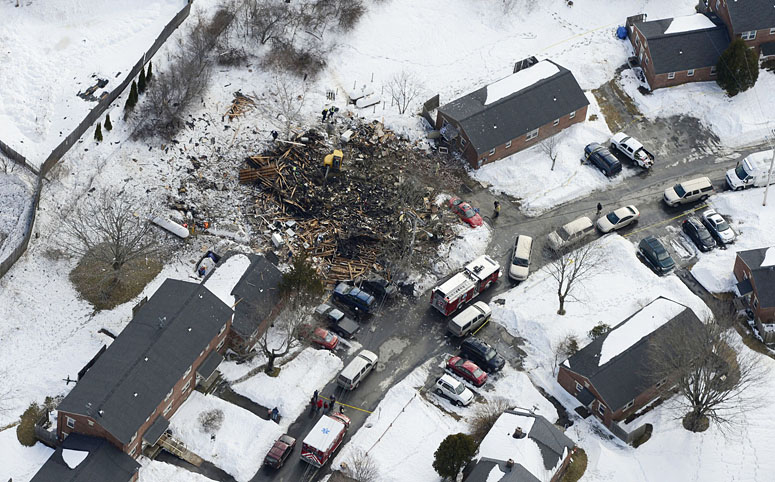
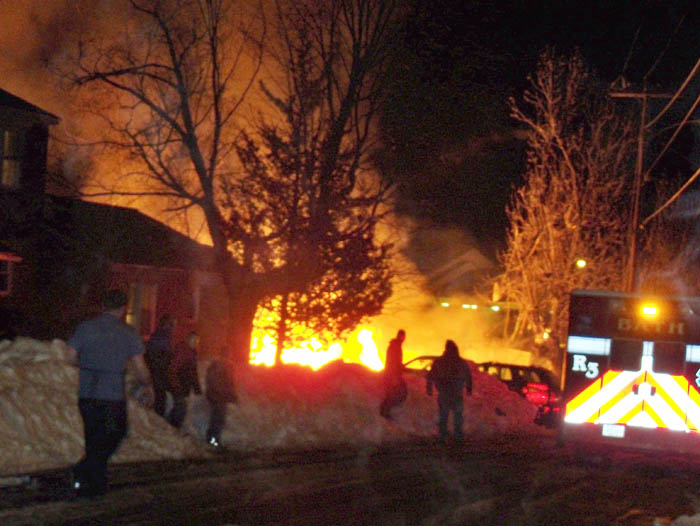
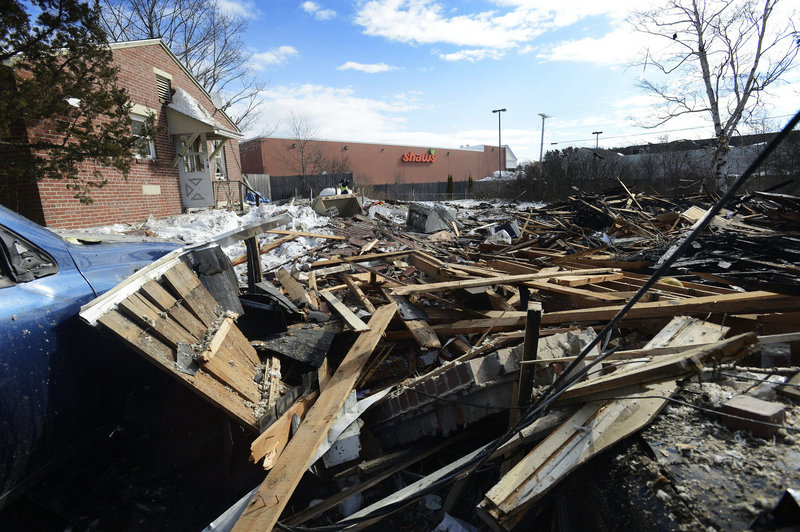
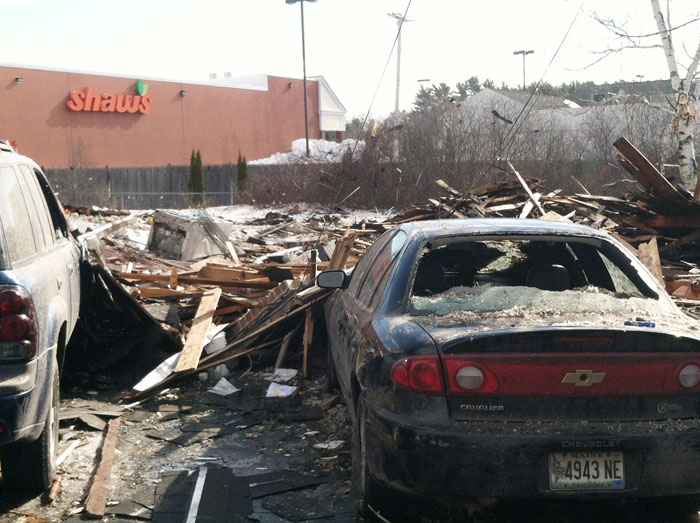
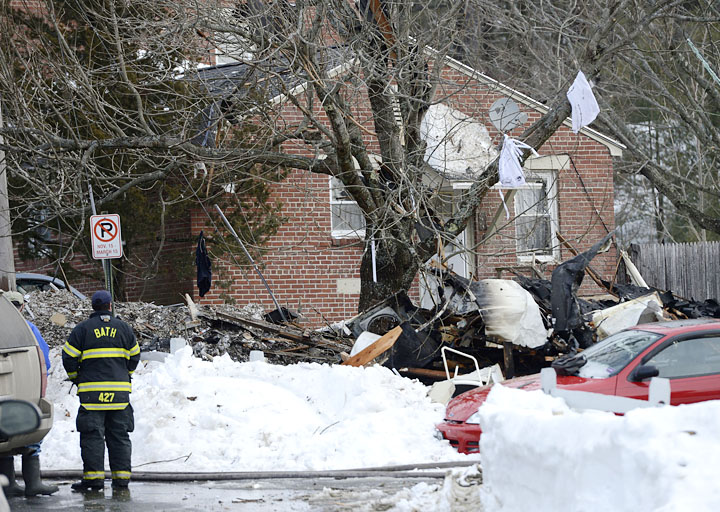

Comments are no longer available on this story